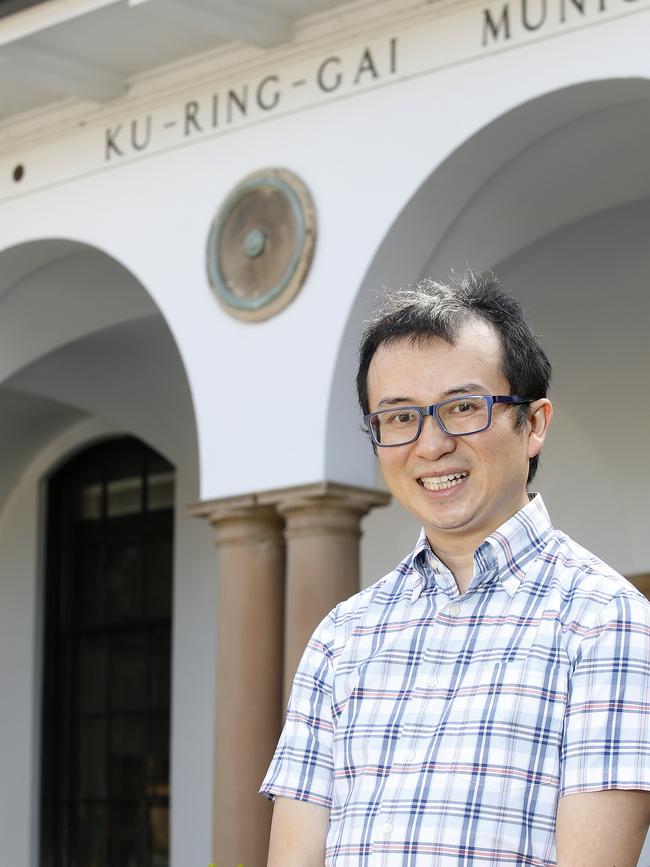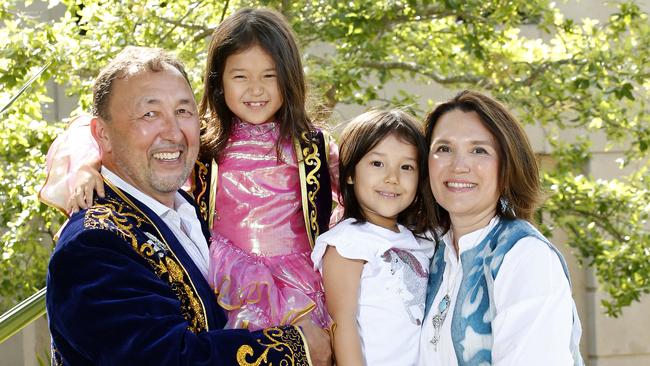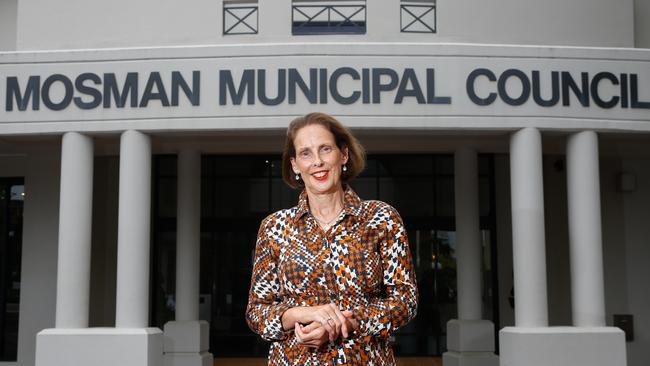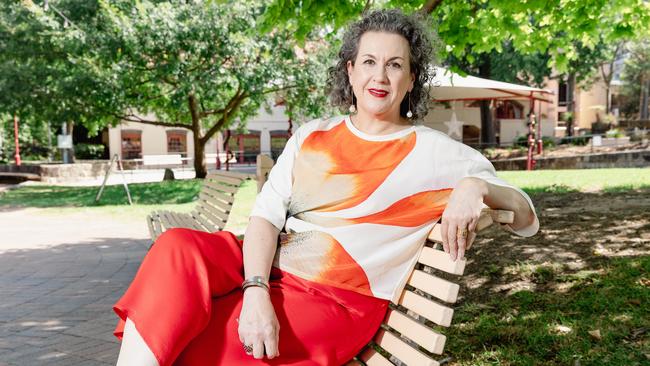Why these ‘new Aussies’ love Australia Day
With continued controversy around Australia Day, these ‘new Aussies’ explain why they are embracing our national day.
NSW
Don't miss out on the headlines from NSW. Followed categories will be added to My News.
On the plus side, the Roseville Public School bulletins which were meant to be handed by Sam Ngai to his parents made wonderful paper planes.
However, Hong Kong-born Ngai, the recently elected mayor of Ku-ring-gai, recalls the downside of not showing his parents the bulletins detailing optional activities such as playing sport was that he and “a few random kids just messed around in the assembly hall”.
Ngai, who immigrated with his family when he was four, laments that while many of his classmates played sports such as cricket or rugby, his decision to “fold the bulletins into aeroplanes and fly them around” left his hardworking parents completely unaware of the extra-curricular opportunities.
The memory prompts his recommendation to newly arrived families from overseas who might adopt an insular approach: “Don’t limit yourself to people from your own cultural background. Although they can help you transition to life in Australia, there are also other groups such as school parents’ associations and local sporting organisations. That way you’ll build friendships and understanding and have a greater sense of community.”

Immigrants such as the Ngai family continue to play a major role in life on Sydney’s north shore.
The latest census figures show 42.6 per cent of Ku-ring-gai residents were born in another country, including China, the United Kingdom and South Africa.
The data also reveals 35.3 per cent of people in the Mosman Council municipality were born overseas compared with 38.6 per cent in Greater Sydney and 39.9 per cent in the North Sydney Council area.
Commenting on refugees who consider living in Ku-ring-gai, Ngai says the cost of living, including housing, has potentially “priced them out but the council and local residents have done what we can to support refugees in terms of affordable housing”.
In the lead-up to this year’s Australia Day citizenship ceremonies, the 40-year-old offers the following advice to immigrants based on his own experience: a career isn’t everything.
“Children assimilate into Australian culture quickly but their parents, having left behind friends, networks and jobs, want to make a good life here so they work very, very hard and they encourage their children to work hard academically at a cost to other things such as a social life,” he says.
“I recognise the importance of academic performance but people also need to value social cohesion, they need to participate in the community and that will be part of what sets you up for success in Australia.”
A man who follows his own advice, Ngai resigned as an auditor with an energy company after being selected as mayor in September. He also set aside his plans to study to be a church minister and now works full time in his mayoral role.

On the family front, Ngai’s wife Kathryn has Scottish-French heritage. They have two children with another on the way.
“When I compare my life as a migrant child to my children’s … well, life is cushy for them,” he says. “Whereas in the migrant family experience, it’s about getting started. It’s about surviving.”
At Ku-ring-gai Council’s 2024 Australia Day citizenship ceremony will be two immigrants – Lana and Kairat Nurkenov – who understand all about starting again in a new country. Arriving five years ago from Kazakhstan with son Arsen, the Nurkenovs quickly learnt their former careers meant nothing here.
Lana, a radiologist, currently works in a friend’s coffee shop. Kairat, after being told by the global company he worked for in Kazakhstan (perks included a car with driver, personal assistant and six months of international travel annually) that because he didn’t have an Australian network he wasn’t needed in Sydney, is a customer service officer for Transdev’s Sydney Light Rail.
Their daughter, Aizhan, had already settled with her own family on the north shore and the Nurkenovs have never regretted their decision to move to the same area.
From day one they were delighted. After flying into Sydney from their home in the busy city of Almaty, they discovered East Killara, where a contact had found them an apartment to rent.
“A complete change in lifestyle,” remembers Lana.
Her husband recounts their first walk: “It was a hot, quiet day and we could hear nothing but the breeze in the trees. Everything was green and the biggest surprise when we walked for kilometres was that we saw nobody.”
And when they finally met the locals? “Everyone is friendly,” says Kairat. “People from different backgrounds, different accents... there is a great mix of cultures.”
He adds that an immigrant to Australia will become “a new person”.
“They should remove all the mental boundaries they’ve built up over years. Ideally, they need a circle of trusted friends but they should also create a wider network through social media, work or hobbies. They should try their best to stay visible in the community.”
On the subject of staying visible, the Nurkenovs have a high-profile hobby: they appear as extras in films and television shows. You may spot them in the upcoming Ryan Gosling movie The Fall Guy, shot in Sydney, plus the TV series NCIS: Sydney and Home and Away.
In the Mosman municipality, mayor Carolyn Corrigan hosted a series of citizenship events last year to help minimise the potential waitlist with up to 60 conferees from 30 different countries at each of the six ceremonies.

At Mosman’s upcoming Australia Day citizenship ceremony, Corrigan will announce the area’s Citizen of the Year and Young Citizen of the Year.
And her personal view of the ceremonies? “I have the joy of sharing very special moments with people from many different backgrounds. It’s inspiring to hear their stories and what has brought them to Mosman, as well as sharing what our community has to offer.
“We welcome new residents and visitors and celebrate community harmony, respect and cultural diversity. Migrants bring the opportunity to enrich so many facets of community life, from food to art, culture, innovation and economic development.”
Corrigan encourages newcomers to utilise the council’s venues and services “to get to know Mosman and make social connections”. She adds that many of the activities, such as weekly English conversation classes, are free and “offer great insights into life in Mosman as well as opportunities to seek community support”.
Both the Mosman and North Sydney councils actively assist the Lower North Shore Multicultural Network – the local peak representative body for multicultural communities. The network liaises with not-for-profit organisations and government agencies including those delivering services to improve the health and wellbeing of immigrants and refugees.
North Sydney Mayor Zoe Baker says people taking citizenship at the council’s ceremonies demonstrate that not only do they wish to be formally part of the Australian way of life but also that they want to participate more fully in the community.

Her recommendation to them is to volunteer: “Volunteering opens up a community to newcomers and, at the same time, there’s a sense of wellbeing for contributing to the place where you now belong.”
She says the council has a long-term commitment to assist refugees – for example, since the war in Ukraine, refugees from that country “have begun to settle in North Sydney to be close to relatives and friends”.
To show support, the council staged a “Standing with Ukraine” event in partnership with the Ukrainian Council of NSW and Settlement Services International. For the second year running, the council will also play a leading role in Refugee Week in June.
Baker highlights the benefits flowing from newcomers choosing North Sydney.
“They’re mainly skilled workers or students,” she says. “Skilled workers bring tangible experience which is of benefit to their new colleagues and the nation, while education is worth billions of dollars to Australia.”
She highlights that the North Sydney local government area has a high concentration of health, technology and financial organisations plus it is the densest education precinct in the country with a university campus and 16 primary and secondary schools within about 11sq km.
“There’s a very rich legacy from immigration to North Sydney,” Baker says. “It has made us who we are today.”
More Coverage
Originally published as Why these ‘new Aussies’ love Australia Day




